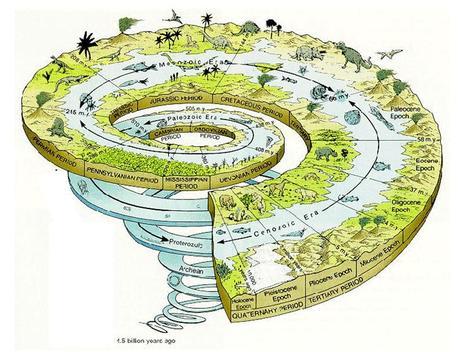In this Aeon piece by philosopher John Schellenberg, he contemplates the nature of deep time. He correctly observes that deep time is almost always backwards looking, into the deep past, and this prevents us from contemplating the deep future. He suggests this is due, in part, to Christian cosmology:
Whether you think of it as casting a long shadow across the history of Western culture or as fathering a great light within it, there is no denying the Bible’s powerful influence on the way that we think today. And you might have noticed that there’s not much about a billion-year future in it. The Bible does not tell us ‘The beginning is near!’ but rather ‘The end is near!’ When I was a child, I helped my father put an actual sign at the end of our driveway that said ‘Jesus is coming soon!’ And although his brand of enthusiastic evangelicalism sponsored endless disputes with other Christians – even other evangelicals – as to how things will transpire in the near future, on the matter of whether we are living in the end times he was in lockstep with other biblical believers. If you allow for secular eschatologies, he was also in lockstep with the rest of the culture, which has by now spun out rather a large number of variations on the biblical Armageddon-just-around-the-corner theme. We all want to live in the most exciting, most consequential chapter of time, it seems.
I grew up in an apocalyptic-evangelical home, so I know the dreadful feeling. But when it comes to secular eschatologies, I can think of other good reasons for not contemplating the deep future. This review of Elizabeth Kolbert’s new book, The Sixth Extinction: An Unnatural History, has an Anthropocene-apocalyptic or eschatological feel to it.
But this aside, I’m not sure it is a good idea to be contemplating time in this manner. As much as I love the deep past, in the form of fossils, geology, and evolutionary history, I’m not sure it is altogether healthy or, as Nietzsche might say, conducive to life. It is revealing that when Schellenberg asks us to imagine deep time, he uses a spatial metaphor laid out in yardstick or linear fashion. When imagined this particular way, time is the distance between two points. The spaces or places in between those those points are more or less irrelevant. This is a classic Christian or linear conception of time.
There are of course alternatives to this kind of conception, and not everyone imagines time in this way. In fact, there are those who think time is a property of space, and that the past, present, and future can be found in particular places. Time, in other words, is subordinated to space.
Last summer I was on the Pine Ridge Reservation visiting a friend; he is a Lakota traditionalist and elder. During one of our conversations, I talked for a good while about evolution and archeology. When I finished, there was a long pause, and he said: “You seem to be obsessed with time. This may not be good for you.”
Though I didn’t really understand him at the time, I do here and now.


